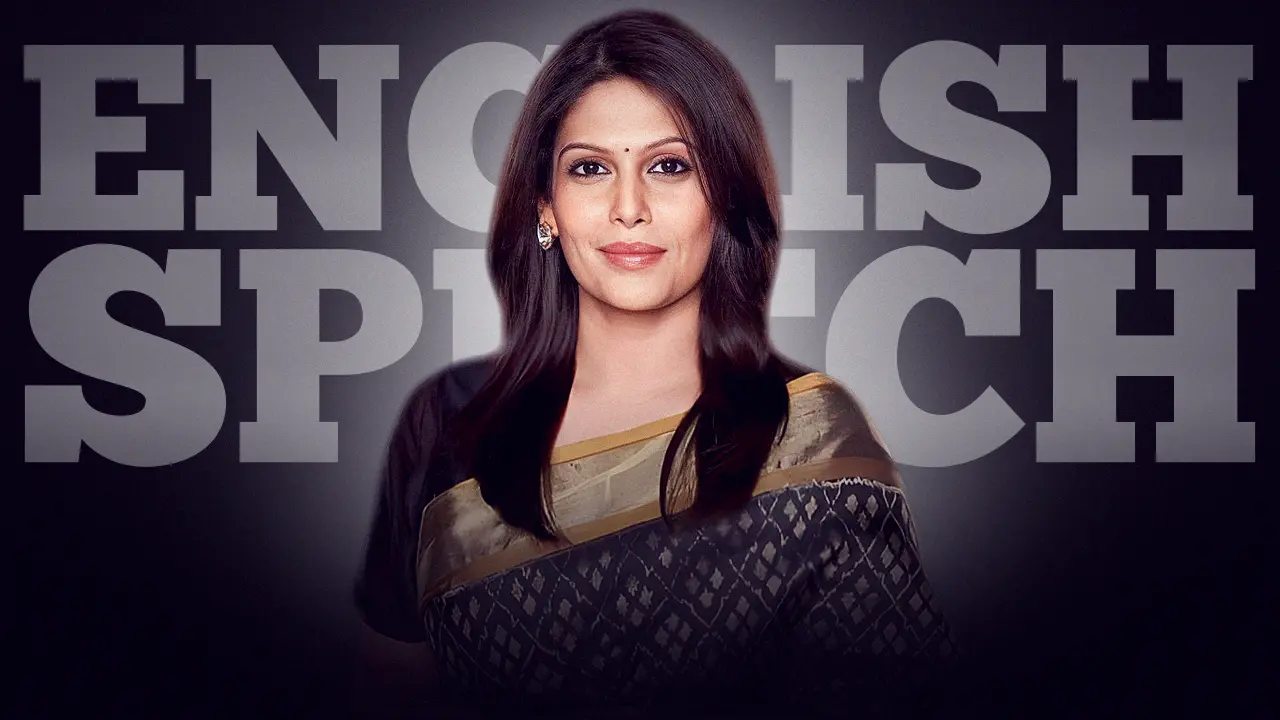Palki Sharma: Tell India’s Story
Learn English with Palki Sharma. Meet Palki Sharma Upadhyay, an award-winning journalist and the Managing Director at Wion, India’s only international news channel. She hosts India’s most-watched prime time show, Gravitas. In this compelling speech, Palki discusses the power of storytelling and the importance of homegrown perspectives in journalism. Dive into her thought-provoking ideas and see how storytelling shapes national and global opinions.
English Lessons,
Download available
for Plus Members
🎯 1000+ English files (PDF, MP3, Lessons)
PDF Transcript
Access the full speech in an
easy-to-read PDF format.
Audio Version
Listen and download clear,
high-quality MP3 recordings.
English Lesson
Includes vocabulary
and grammar practice.
Offer ends in:
01
Days
:
15
Hours
:
29
Mins
:
42
Secs
Offer ended.
Download available
for Plus Members
PDF Transcript
Access the full speech in an
easy-to-read PDF format.
Audio Version
Listen and download clear,
high-quality MP3 recordings.
English Lesson
Includes vocabulary
and grammar practice.
Offer ends in:
Offer ended.
Transcript, and Audio Here!
Get better at English by downloading the newest speeches right now! Unlock our huge library of nearly 1,000 files, including detailed speech transcripts, audio, and lessons. New content added weekly. Take your English to the next level today!
Palki Sharma | Quote
“Tell the right stories.” Palki Sharma
Palki Sharma | FULL TRANSCRIPT:
I promise I’ll keep it short, I don’t have a teleprompter anyway, so. Let me start by thanking the Rastriya Patrakarita Kalyan Nyas for this award. Let me also congratulate them for all the good work that they’re doing to promote journalism in India. I think this award and this recognition today is for my team, my channel, and for the journalism that we do and for the purpose that we hope we serve.
What is the purpose, we ask ourselves. I think what we set out to do was to tell India’s story in India’s words. The show I do, it’s called Gravitas, and the tagline is making sense of the news. But essentially we’re trying to make sense of the world through India’s perspective. Ladies and gentlemen, I’ve said this in the past, and I say it again, and I believe this, that our world today is a grand storytelling competition. We are all striving to present our national, cultural, personal, all kinds of stories in the most persuasive manner.
I remember reading somewhere in the olden times they used to say that if you want to poison a people, you should poison their wells. They’ll have contaminated water, they’ll die. Now it is said that if you want to poison a people, you poison their stories. When you poison their stories, you contaminate their minds, and it’s worse than dropping bombs because then you take away the self-confidence of a country. You devastate their morale. I think that is more damaging any day than poisoning water or poisoning wells. You make a country doubt its abilities.
And we Indians have been through a very difficult phase where we were colonized, and while we achieved independence 75 years ago, I think somewhere a lot of us are still colonized in our minds. We need to come out of that. So it is important to tell stories and tell the right stories in the right manner because stories sway people. They change the course of policies, politics, and indeed the world. And this is my favorite example from the Second World War. America had a list of cities in Japan that they wanted to bomb with the atom bomb. And on that list was the city of Kyoto.
But the U.S then had a Secretary of War, and he decided that Kyoto should not be part of the list. We know which two cities were bombed eventually, Hiroshima and Nagasaki. He removed Kyoto because this Secretary of War in America had been to Kyoto on his honeymoon, and he saw how beautiful Kyoto is and how rich it is culturally, and he believed that that culture should not be destroyed. So the story of Kyoto won, and the story of Nagasaki and Hiroshima lost, which is why it is very important to also control your story, to actively shape it.
We are a country of 1.4 billion people. We have more than 800 channels. We have a lot of content, and our phone is full of stories and videos and reels and all sorts of things that you all consume. We are a very aware and politically engaged people. From the tea seller to the CEO of a company, everybody knows what’s happening. They can talk to you about Biden’s policies, and they can also weigh in on what’s happening in Bihar and everything in between. But we seek validation from the foreign press.
If you’ve seen what’s been making news in the past couple of days, you would know. The New York Times writes something about a policy in India, and it immediately becomes a Twitter trend. But why do we need a certificate from the foreign press? We may trash it. We may say that we don’t care about what the New York Times is saying, but we do because we discuss it. It affects us. We react to it. We consume it. The Economist says something about who we should vote for in an Indian election, and it becomes part of the political debate.
And while we’ve achieved a lot in India in the last 75 years, we’ve not had a single newspaper in this country. Can you imagine an Indian newspaper publishing a headline about something in the US or the UK, and for that making it to the big political story of that country? Will American leaders debate what is written in the Indian Express? Will British leaders debate what’s written in the Times of India? They’re not affected by what we are saying, but we are affected by what they say about us.
If there’s a disturbance in Kashmir, the BBC reports it, the Al Jazeera reports it. And they use their own lens, their own editorial biases, and all media is agenda-driven. I was discussing it with someone earlier today. India’s first newspaper, Hickey’s Gazette, was a very anti-imperial newspaper. It had an agenda. It took sides. Media takes sides. And that is okay. The argument I’m making is very simple. We are a land of epics like the Mahabharata and Ramayana, and yet we’ve allowed others to take control of our story for way too long. And that is what we try to do at WION still.
I started with talking about our purpose, and that is our purpose, to tell India’s story. And we found a willing and a very welcoming audience in all of you, and a lot of Indians. I’m very happy to share with you that only 40% of our audience and our viewers are in India. The remaining 60% are outside India, which gives us a lot of hope. That in Europe, in Africa, in America, in Southeast Asia, there is an audience that wants to listen to India’s perspective on what’s happening in the world, that wants to know what India feels about global developments. And it’s only time for a country that is ready to assume its role as a global leader to have a voice like that.
When we began this journey in WION five years back, we are a young channel, we believed in the product, we believed in what we were trying to do. But we never imagined that in so short a time we’d get the kind of response that we do now. I was in Ukraine earlier this year, and people saw the mic, and there were some Indians, and they walked up to us and they said, this is our channel. And that gives us a lot of encouragement to do more of what we are doing. The numbers encourage both me and my team, and awards like these, thank you very much, also inspire us to do better every day.
So on behalf of my team at WION, I want to once again thank you for the award. Thank you very much.
Palki Sharma






